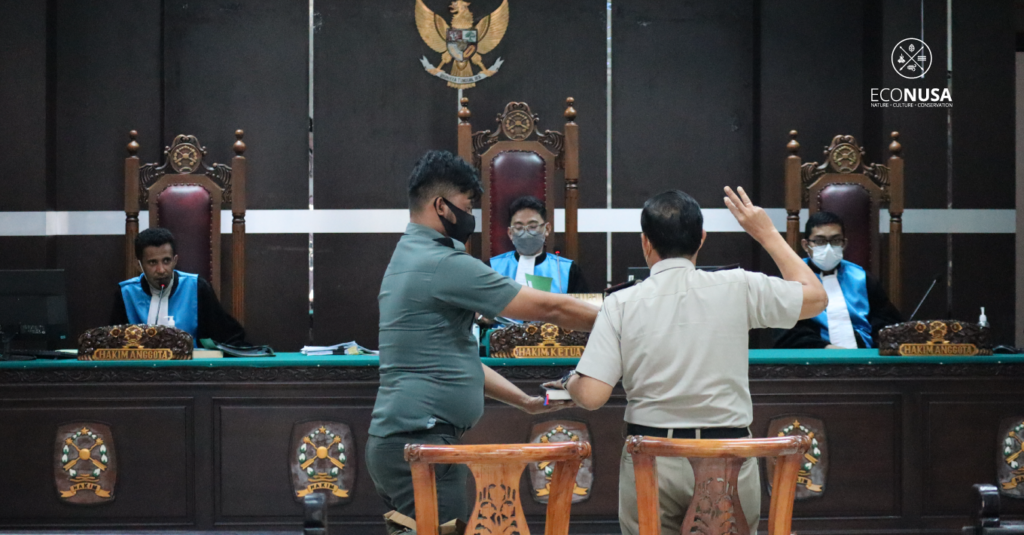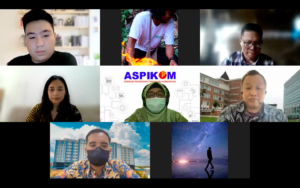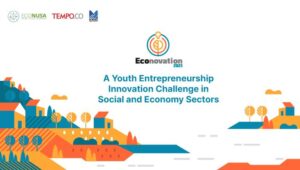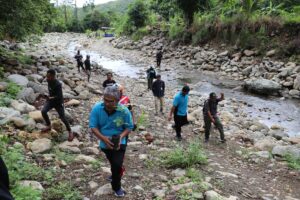
The next trial filed by the two palm oil companies against the government of South Sorong Regency was held at the Jayapura High Administrative Court on Tuesday, 19 April 2022. The trial agenda was hearing expert witness from Agustinus Palesang, the National Land Agency, and Victor Manengkey, Cenderawasih University (Uncen). Both experts gave testimonies on two different cases referring to the lawsuits with registered number of 45/G/2021/PTUN.JPR filed by PT Anugerah Sakti Internusa (ASI) and of 46/G/2021/ PTUN.JPR charged by PT. Persada Utama Agromulia (PUA).
Agustinus Palesang in his testimony said that he had just heard the name of PT ASI and PT PUA after the government of South Sorong Regency called him to observe the administration of both companies. As to him, from the document check, the South Sorong Regency’s National Land Agency only received a copy letter on the Environmental Impact Analysis (AMDAL).
Read also: Two Palm Oil Companies Prosecuting South Sorong Regent Never Having Activities
When asked about the letter on the right to cultivate (HGU) release, letter on customary land release, and other notice letter from both companies, Agustinus admitted that there was no document sending to the South Sorong Regency’s National Land Agency. “There is no other document but only a copy of AMDAL that I only saw,” said Agustinus.
When the testimony given by the Head of South Sorong National Land Agency was sufficient without any further query from the lawyers of both plaintiff and defendant, the trial was proceeded with expert witness from Cenderawasih University, Victor Manengkey.
Victor should explain authority, procedure, and substance of licensing aspects at the court. As to him, in terms of authority, a local official issuing the license could revoke the issued license. “In the later progress on legal issue, superior official above the permit issuer could either revoke the license through the State Administrative Court,” said Victor.
Read also: Following Palm Oil License Revocation in West Papua, What’s Next?
According to Victor, the government and investor are deemed development partners. If there is lawsuit filed by a certain party, it implies that there is another party whose interest is not accommodated yet. There are two causal possibilities. It might happen because one party fails to comply with the obligations stipulated by the decree or the decree has been expired.
Victor said that the revoked decree due to its expiry should be out of discussion as it is the rights of the license issuer. However, if the revoked license is not due to the expiry, it implies that there are procedure, authority, or obligation the parties failed to comply.
Victor admitted that licensing system in Indonesia has not function well yet and thus problems arising from licensing could not be easily resolved. For the reason, he suggested to observe the substance of the decree in which the parties’ obligations are mentioned. “The decision here refers to the substance of the license. There might be many issues ignored by the license holders that leads to license revocation. But, it does not overlook the license issuer’s evaluation and monitoring,” he elaborated.
Read aslo: Jayapura Court Gave Another Rebuff to Palm Oil Lawsuit
In response, plaintiff’s lawyer, Iwan Niode, said that based on the evidence investigation process, expert witness, the company believed in the substance filed in the lawsuit. “The defendant’s procedure in license revocation of both rights to cultivate and location permit, was not based on the regulation, particularly the Agriculture Minister Regulation Number 98/2013 and Law Number 39/2014. That is the core of this lawsuit,” he said.
After trial, South Sorong Regency’s Assistant for Economic and Development, Yohan Hendrik Kokulele, representing the Regent of South Sorong, said that, with reference to the expert witnesses testimonies, the decision made by South Sorong Regent did not oppose the Indonesian legal and law. The license revocation was done following the evaluation of palm oil license done by West Papua Provincial Government as mandated by the Presidential Instruction Number 8/2018 on the Suspension and Evaluation of Palm Oil Plantation License issued in September 2018.
“What we do in South Sorong is part of the national actions to save natural resources. If the action contradicts with the law and regulation, it is the central government that should be sued, isn’t it? All parties should have supported this action to make order,” he said.
Based on the testimonies addressed by the witnesses on the trial last week, PT ASI and PT PUA were declared that they never operated in South Sorong. “How is it possible that a never-existing company without any activity would sue the host who will order their house properly? That is what we call impolite and uncivilized,” said Yohan.
As to Yohan, the story will be different if both companies had run their operations on the ground. That must have undergone eligible procedure with supports from the indigenous people. “But both companies have unclear administration without obvious office location and the indigenous people rejected them. It implies that the measures taken by South Sorong Regency government by revoking both companies licenses are correct for the sake of the indigenous people and security of natural resources in Papua,” he added.
The court chaired by the Jayapura High Administrative Court led by Firman scheduled the next trial with concluding agenda on Thursday, 28 April 2022 virtually at 10.45 Eastern Indonesian Time. “Both parties are expected to upload their own conclusions before 10.45,” said Firman concluding the trial.
Editor: Nur Alfiyah







